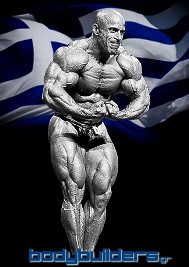Προσφατη μελετη πανω στην γνωστη μας κιτρουλινη, οπου 2 ομαδες συμμετεχοντων λαμβανε ειτε placebo (citric acid) ή 8γρ μηλικης κιτρουλινης, και συμμετειχαν σε εξασκηση German Volume Training με 10 σετ των 10 επαναληψεων.
Το συμπερασμα της μελετης ηταν πως μια οξεια δοση κιτρουλινης δεν επηρεαζει σημαντικα την αναεροβια αποδοση.
Οι ερευνητες αναφερουν επισης πως προηγουμενες μελετες καταφεραν να βρουν θετικες επιδρασεις της συμπληρωσης με κιτρουλινη, αλλα αυτο περιοριζεται σε ασκηση αντιστασεων με υψηλη ενταση.
Η ικανοτητα της κιτρουλινης να αυξανει την αργινινη και ενδεχομενως να επηρεαζει το νιτρικο οξειδιο, αλλα και την καθαρση της αμμωνιας, παραμενει εγκυρη.
Αν και η παρουσα μελετη προσθετει στοιχεια στη σχετικη βιβλιογραφια για την κιτρουλινη, απαιτουνται περαιτερω δοκιμες για να ελεγχθει η αποτελεσματικοτητα της.
-----
Citrulline malate supplementation does not improve German Volume Training performance or reduce muscle soreness in moderately trained males and females
Andrew J. ChappellEmail authorView ORCID ID profile, Daniel M. Allwood, Rebecca Johns, Samantha Brown, Kiran Sultana, Annie Anand and Trevor Simper
Journal of the International Society of Sports Nutrition201815:42
Background
Use of supplements to aid performance is common practice amongst recreationally active individuals, including those without a sufficient evidence base. This investigation sought to assess whether acute supplementation with 8 g of citrulline malate (CM) (1.11: 1 ratio) would improve anaerobic performance.
Methods
A randomised double blind placebo control trial was employed, using a counterbalanced design. We recruited recreationally active men and women to take part in an isokinetic chair protocol, based on German Volume Training (GVT) whereby participants attempted to perform 10 sets of 10 repetitions against a force representing 70% of their peak concentric force.
Results
The number of repetitions achieved over the course of the GVT was 94.0?±?7.9 and 90.9?±?13.9 for placebo and CM respectively. There was no significant difference between the placebo and CM treatment for number of repetitions (P?=?0.33), isometric (P?=?0.60), concentric (P?=?0.38), or eccentric (P?=?0.65) peak force following the GVT. Total muscle soreness was significantly higher in the CM compared to the placebo treatment following the GVT protocol over 72 h (P?=?0.01); although this was not accompanied by a greater workload/number of repetitions in the CM group.
Conclusions
We conclude that an acute dose of CM does not significantly affect anaerobic performance using an isokinetic chair in recreational active participants. Practical implications include precaution in recommending CM supplementation. Coaches and athletes should be aware of the disparity between the chemical analyses of the products reviewed in the present investigation versus the manufacturers? claims.
Το πληρες κειμενο: https://jissn.biomedcentral.com/arti...970-018-0245-8
Results 1 to 3 of 3
Threaded View
-
16-08-18, 21:20 #1
 Citrulline Malate - Καμία Βελτίωση Σε Εξασκητική Απόδοση
Μεγάλες Εκπτώσεις Συμπληρωμάτων Διατροφής <==== Πατήστε Εδώ!
Citrulline Malate - Καμία Βελτίωση Σε Εξασκητική Απόδοση
Μεγάλες Εκπτώσεις Συμπληρωμάτων Διατροφής <==== Πατήστε Εδώ!
--------------------------------------------------
- M.Sc.
- ISSA BODYBUILDING Specialist
- NSCA Certified Personal Trainer
- NASM Certified Nutrition Coach
"Να θυμάστε ότι αυτό που κάνετε είναι κάτι που ελάχιστοι άνθρωποι στον κόσμο έχουν τη δύναμη της θέλησης ή την αποφασιστικότητα να πραγματοποιήσουν. Χρειάζεται κάτι πολύ περισσότερο από τη σωματική μας δύναμη για να χτίσουμε και να σμιλέψουμε το σώμα μας. Χρειάζεται και μια τεράστια ποσότητα πνευματικής δύναμης, και αυτό είναι που οι υπόλοιποι άνθρωποι πραγματικά ζηλεύουν. Πάρτε το ως κοπλιμέντο, διότι ξεχωρίζετε μέσα σε ένα πλήθος ατόμων που μόνο ξέρουν να είναι ακόλουθοι."
"Just remember that you are doing something that so few people in the world have the will power or determination to do. It takes much more than physical strength for us to build and sculpt our bodies. It takes an enormous amount of mental strength as well, and that's what people are truly jealous of. Take it as a compliment, for you stand out in a crowd full of followers."
"You got a dream, you gotta protect it. If people can't do something themselves, they wanna tell you that you can't do it. If you want something, go get it. Period." ~ Chris Gardner
Thread Information
Users Browsing this Thread
There are currently 1 users browsing this thread. (0 members and 1 guests)
Similar Threads
-
Οξεία Λήψη Μηλικής Κιτρουλίνης Βελτιώνει Την Εξασκητική Απόδοση Σε Γυναίκες!
By Musclemar in forum Επιστημονική Και Ερευνητική Προσέγγιση BodybuildingReplies: 16Last Post: 18-10-16, 11:55 -
Beta alanine + citrulline
By athbol in forum Συμπληρώματα Διατροφής BodybuildingReplies: 6Last Post: 18-09-16, 19:43 -
Citrulline - Carnitine - Beta Alanine?
By SotirisUK in forum Συμπληρώματα Διατροφής BodybuildingReplies: 6Last Post: 10-02-15, 23:18 -
Tricreatine-Malate VS Creatine Monohydrate
By Arny in forum Αξιολογήσεις Για Συμπληρώματα ΔιατροφήςReplies: 3Last Post: 19-02-08, 23:12







 Reply With Quote
Reply With Quote
Bookmarks